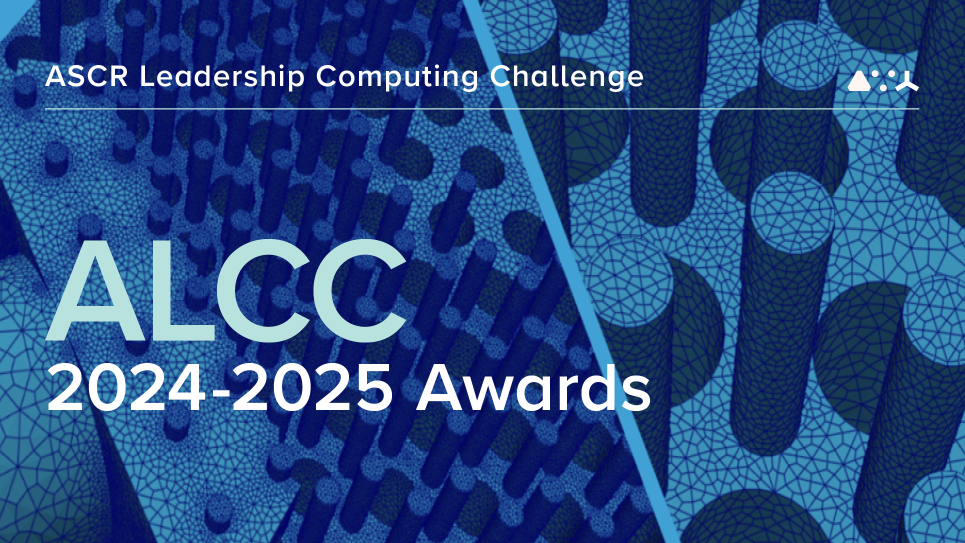
DOE’s ALCC program awards ALCF computing time to 16 projects
The 2024-2025 ALCC projects will use the ALCF's Aurora and Polaris supercomputers to pursue breakthroughs in science and engineering.
The U.S. Department of Energy’s (DOE) Advanced Scientific Computing Research (ASCR) Leadership Computing Challenge (ALCC) has awarded supercomputing time at the Argonne Leadership Computing Facility (ALCF) to 16 projects that will pursue advances in areas ranging from quantum chemistry to clean energy technologies to AI for science.
Each year, the ASCR program, which manages some of the world’s most powerful supercomputing facilities, selects ALCC projects in areas that aim to further DOE mission science and broaden the community of researchers capable of using leadership computing resources.
The ALCC program allocates computational resources at ASCR’s supercomputing facilities to research scientists in industry, academia, and national laboratories. In addition to the ALCF located at DOE’s Argonne National Laboratory, ASCR’s supercomputing facilities include the Oak Ridge Leadership Computing Facility (OLCF) at Oak Ridge National Laboratory, and the National Energy Research Scientific Computing Center (NERSC) at Lawrence Berkeley National Laboratory. The ALCF, OLCF, and NERSC are DOE Office of Science user facilities.
The 16 projects awarded time on the ALCF’s Aurora and Polaris systems are listed below. Some projects received additional computing time at OLCF and/or NERSC. The one-year awards begin July 1. For the full list of 2024-2025 awards and project fact sheets, visit the ALCC website.
- Thomas Blum from University of Connecticut received computing time on Aurora for “Hadrionic Contributions to the Muon g-2 from Lattice QCD.”
- Margaret Cheung from Pacific Northwest National Laboratory received computing time on Aurora and Polaris for “Building Digital Twin of a Model Host-Pathogen System for Enhancing Biopreparedness.”
- Som Dutta from Utah State University received computing time on Aurora and Polaris for “DNS of Buoyancy-Driven Flows for Developing NN-Informed High-Fidelity Turbulence Closures.”
- Mark Gordon from Ames National Laboratory received computing time on Aurora for “Highly Scalable Ab-Initio Simulations of N-Doped Porous Materials for Carbon Capture.”
- Ore Gottlieb from Flatiron Institute received computing time on Aurora for “Simulating Large-Scale Long-Lived Neutron Star Remnants from Binary Neutron Star Mergers.”
- Allan Grosvenor from MSBAI received computing time on Aurora for “Autonomy for DOE Simulations.”
- Felipe Jornada from Stanford University received computing time on Aurora for “Predicting Heterogeneous Photocatalysts Using Large-Scale Ab Initio Calculations.”
- Taehun Lee from City University of New York received computing time on Polaris for “High-Fidelity Simulations of Helium-Air Mixing in High-Temperature Gas Reactor Cavities.”
- Xiaoyi Lu from University of California, Merced received computing time on Aurora and Polaris for “Scalable and Resilient Modeling for Federated Learning Systems and Applications.”
- Daniel Mejia Rodriguez from Pacific Northwest National Laboratory received computing time on Aurora for “Exploring Exascale Quantum Chemical Methods for Transition Metal Chemistry.”
- Misun Min from Argonne National Laboratory received computing time on Aurora and Polaris for “Exascale Computing for Energy Applications.”
- Ivan Oleynik from University of South Florida received computing time on Aurora for “High Energy Density Physics of Novel Inertial Fusion Energy Ablator Materials.”
- Robert Rudd from Lawrence Livermore National Laboratory received computing time on Polaris for “Machine Learning-Enabled Atomistic Simulation of Iron at Extreme Pressure.”
- Dillon Shaver from Argonne National Laboratory received computing time on Aurora and Polaris for “High-Fidelity CFD Enabling Advanced Nuclear Power.”
- Shinjae Yoo from Brookhaven National Laboratory received computing time on Aurora and Polaris for “Foundation Neuroscience AI Model-NeuroX.”
- Yiqi Yu from Argonne National Laboratory received computing time on Polaris for “High-Fidelity Numerical Analysis on Flow and Heat Transfer Behavior in Involute Plate Research Reactor to Support the Conversion Program.”